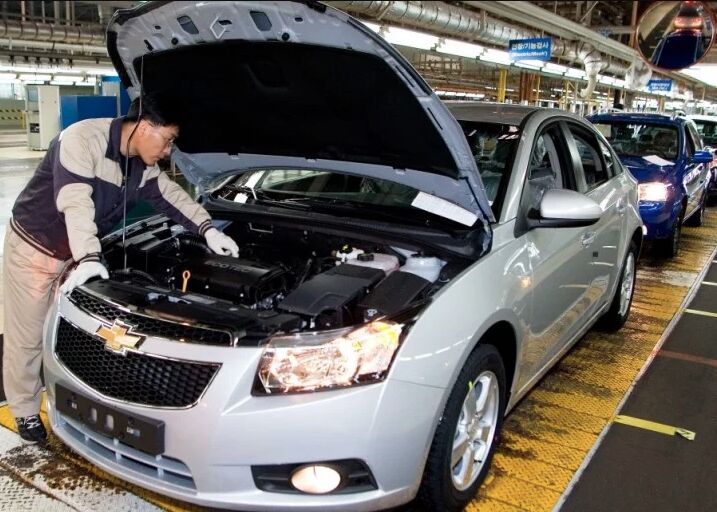Take the Cash, Hit the Bricks: Nearly 2,500 Korean Workers Opt for GM's Voluntary Redundancy Package

Union officials have stated that roughly 2,500 workers from General Motors’ South Korean unit have applied for a redundancy package offered as part of the automaker’s comprehensive restructuring of the region. The number represents around 15 percent of total GM staff in the area and should make negotiations with one of the most inflexible workers’ unions on the planet that much easier.
Still, what General Motors plans to do with its remaining South Korean factories is unknown, but it has already announced one closure. This has left many wondering if the automaker will abandon production in the country entirely. Fortunately, the Korean workforce has not responded with violence. In fact, many appear to see the writing on the wall, opting to take a buyout rather than cause a fuss during the restructuring.
GM’s South Korean business is mainly focused on building cars for export. It currently employs 16,000 individuals and endured its fourth straight year of operating losses in 2017. Already damaged by the automaker’s decision to pull the Chevrolet brand from the European market, this year looks to be no better.
“It looks the redundancy program has been well received by workers,” Cho Seong-jae, a senior fellow at the Korea Labor Institute said. “It seems that workers have given up any hope. They are fed up as the Gunsan factory has been underutilized for the past two to three years.”
Corporate documents seen by Reuters seem to indicate GM plans to cut 5,000 South Korean jobs but keep production steady. However, that’s only if the South Korean government agrees to a $2.8 billion financial aid proposal — meaning it might have been a good time for workers to get out with a redundancy package when they did.
The package, which carried an application deadline of March 2nd, provides outgoing employees with three times their annual salary, money for their children’s college tuition, and upwards of $9,000 towards the purchase of a new car. GM urged employees to take the buyout, suggesting a better deal was unlikely to come around ever again. The automaker has already begun negotiations with union members on wages concessions and finding benefits it can cut to minimize cost.
The Gunsan factory that GM intends to shutdow n saw 941 out of roughly 2,000 workers applying for the redundancy package, according to union officials. What happens to the rest of them hasn’t been decided, thought it’s unlikely they or the remaining Korean workforce will fare well if the government doesn’t want to invest in General Motors’ financial aid proposal.
[Image: General Motors]

A staunch consumer advocate tracking industry trends and regulation. Before joining TTAC, Matt spent a decade working for marketing and research firms based in NYC. Clients included several of the world’s largest automakers, global tire brands, and aftermarket part suppliers. Dissatisfied with the corporate world and resentful of having to wear suits everyday, he pivoted to writing about cars. Since then, that man has become an ardent supporter of the right-to-repair movement, been interviewed on the auto industry by national radio broadcasts, driven more rental cars than anyone ever should, participated in amateur rallying events, and received the requisite minimum training as sanctioned by the SCCA. Handy with a wrench, Matt grew up surrounded by Detroit auto workers and managed to get a pizza delivery job before he was legally eligible. He later found himself driving box trucks through Manhattan, guaranteeing future sympathy for actual truckers. He continues to conduct research pertaining to the automotive sector as an independent contractor and has since moved back to his native Michigan, closer to where the cars are born. A contrarian, Matt claims to prefer understeer — stating that front and all-wheel drive vehicles cater best to his driving style.
More by Matt Posky
Latest Car Reviews
Read moreLatest Product Reviews
Read moreRecent Comments
- Danddd Just say no to CVTs unless you like the sound of droning.
- Oberkanone GM will have 30 EV models by 2025. Over 40% of GM sales will be EV by 2025.quote - Marry Barra circa 2020Including 4 Chevy EV, 2 Buick EV, and 4 Cadillac EV.
- Dwford There's plenty of time between now and 2030-35 to design and sell through a whole new generation of ICE vehicles, if not 2 generations. Chevy seems to be on a dual track plan with ICE and EV versions of the Equinox and Blazer nameplates. No reason Cadillac can't do something similar.
- Kwik_Shift_Pro4X Poop or get off the pot.
- TheMrFreeze The wife unit and I refuse to buy a white/black/grey/silver car...life's too short for boring. As it happens we both drive orange cars right now but slightly different shades. Total coincidence, just happened that the used cars we found that met our requirements (ie: manual trans and at least some amount of character) both happened to be orange. My previous daily driver was orange as well, again total coincidence...they just seem to find us I guess...


































Comments
Join the conversation
GM sales in Korea down 48% in Febuary FK Korea!
GM became the biggest car manufacturer by making cars people wanted where they wanted them via it's subsidiaries like Holden, Vauxhall, Opel and Daewoo. Now that they are disappearing it will have to convince the rest of the world to buy Chevies and Caddies. Good luck with that!